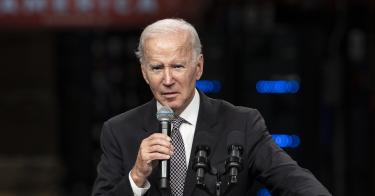President Joe Biden and his congressional allies were very shocked when OPEC+ countries announced they would cut oil production by 2 million barrels a day, starting this November. Some lawmakers even propose punishing OPEC by pulling all U.S. military assets out of the Middle East (conveniently ignoring that those deployments are there to protect U.S. interests).
Clearly, Biden and his allies are frustrated that prices at the pump are going up weeks before national elections. But if anyone deserves punishment for our energy problems, it’s Biden and his green team, not governments in the Middle East. Biden has been throwing our Middle Eastern partners under the bus since he came into office, trying to resurrect a hopelessly flawed nuclear deal with Iran. It’s a deal that would give our friends' archenemy, Iran, many billions of dollars while doing nothing to keep Tehran from getting a nuclear weapon.
American oil companies and refineries have watched Biden take step after step to destroy their industry so as to appease the climate activist crowd. Oh, and all while blaming these same producers for fuel shortages and high prices. Biden is playing politics with domestic and global energy markets. And average Americans are the collateral damage, stuck with soaring energy and fuel costs.
A robust American energy policy could restore stability and affordability to energy markets. At current usage rates, the nation's recoverable reserves are large enough for at least two centuries of petroleum supply. Moreover, we are always finding more reserves or improving technology to access oil more efficiently.
>>> What Europe’s Energy Crisis Means for America
There is no scenario in the near future where we stop needing abundant, affordable sources of gasoline. The U.S. Energy Information Administration sees no prospect of global oil demand decreasing between now and 2050. 90% of Americans' transportation needs are met with petroleum. Electric vehicles—Biden’s vehicle of preference—make up less than 1% of registered vehicles in the United States, and over a third (39%) of them are concentrated in just one state: California.
Petroleum products are used for much more than transportation. Oil is used as a feedstock for everything from pharmaceuticals and plastics to clothing. It’s even part of the glasses Rep. Rashida Tlaib wore at a recent congressional hearing while she berated banks for doing business with oil companies. Barking at OPEC won’t do a thing. If Biden wants to pull America from the brink of an energy crisis, he needs to take a long look in the mirror—and tear up his own energy agenda.
One of the best ways to dilute the ability of OPEC and other nations to manipulate energy markets is to increase global supply. But the Biden administration, states such as California and New York, and too many countries in the EU have done precisely the opposite. Indeed, they continue to pursue policies that impede oil production. For example, at the same time OPEC is scaling back production, President Biden’s Department of Interior is considering a plan to do OPEC one worse: It is seriously considering a plan to forbid any new offshore oil and gas leases—something no president has done.
Amazingly, the department admits this will increase energy prices for Americans but insists energy production should not be a priority. This narrow energy policy of self-imposed restrictions is costing Americans too much. The U.S. is blessed with an abundance of energy, and Americans should be free to access it.
No doubt, the Biden administration will continue to try to spin OPEC’s decision into an argument for the president to force a transition away from conventional energy and into renewables. But renewables are no quick fix. Europe has trod the path Biden wants to follow for the last three decades and is now suffering greatly for it. There need not be an energy crisis. America has an abundance of energy there for the taking, if only our pie-in-the-sky politicians would get out of the way.
This piece originally appeared in the Washington Examiner




